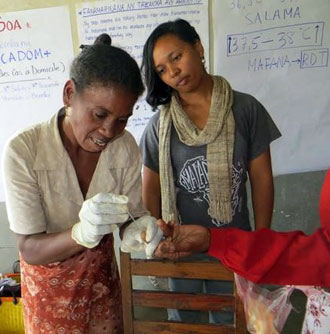
A Malagasy community health worker practices performing an RDT during a training in preparation for a pilot of PECADOM Plus in Madagascar. Credit: Peace Corps Madagascar.
Based on the success of PECADOM Plus (Prise en charge à domicile) in Senegal, Peace Corps volunteers in Madagascar are helping to implement this model for malaria case management in four rural villages in the south and southeast: Mahatsara Est, Maromitety, Beronono, and Lopary. Madagascar is 90 percent malaria endemic and the entire population is at risk of contracting this deadly but preventable disease. Since the east and the southeast coasts of Madagascar have the highest transmission rates, Peace Corps Madagascar has selected Peace Corps volunteers from these regions to pilot this program.
The six-month pilot will run from December 2014 to May 2015, covering the peak malaria months of Madagascar. Four sites will participate in data collection, each with an intervention village and a comparison village. The intervention village will carry out active case detection and the comparison village will serve as the control, carrying out the passive case detection model.
In September 2014, one-day session trainings were conducted by the Peace Corps Malaria Team at each of the four sites with community health workers (CHWs), doctors, and women’s group volunteers. Topics included a review of the basics of malaria, introduction to PECADOM+, hands on rapid diagnostic test (RDT)/artemisinin-based combination therapy (ACT) training and practicum, supply chain review, thermometer usage training, and planning for the coming months.
The four goals of this program are:
- To pilot the program in Madagascar and to test its efficacy within the current Ministry of Health framework for building and strengthening the capacity of CHWs.
- To strengthen the capacity of the CHWs through weekly active case detection for 6 months while under the supervision of the Peace Corps Volunteers and the chief of the Centre Sante de Base (CSB).
- To promote early treatment seeking through the establishment of women’s care groups in each village and by training the women on basics malaria information.
- To diminish the burden of malaria-related morbidity through active detection and testing of fever cases and the prompt treatment of confirmed malaria cases.
It is expected that the results from this pilot will help clarify the prevalence rates of malaria in these communities, as well as guide future programs and policy in Madagascar.
